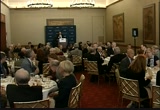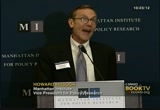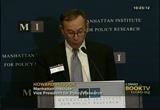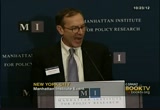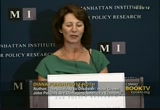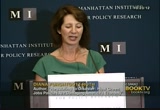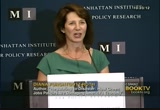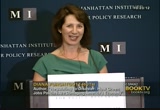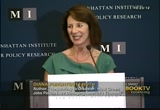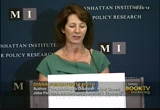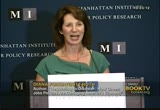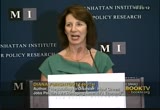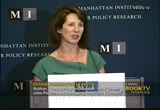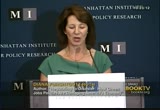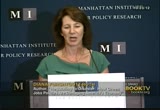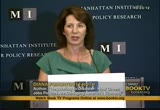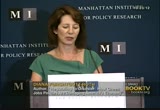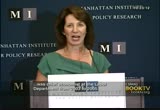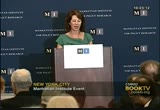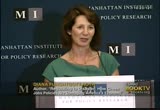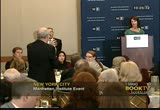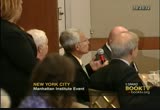tv Book TV CSPAN November 17, 2012 9:15am-10:00am EST
9:15 am
the economy. this is 40 minutes. >> good afternoon. i am vice president for policy research at the manhattan institute. thank you for joining us. the question of whether and how government, particularly the federal government directs tax dollars to specific industries was a discussion in last night's presidential debate and has become an important and ongoing theme in the current presidential campaign. the terms by which washington assisted the finance and auto industries have been the focus of intense debate but the most contentious example of all is the one on which diana furchtgott-roth, senior fellow and speaker this afternoon focuses in her timely and important new book "regulating to disaster: how green jobs policies are damaging america's economy". in it, she subjects assumptions
9:16 am
and policies which led to such ill-fated federal investments as that of the now bankrupt solyndra solar panel manufacturer as well as the a 123 caller battery manufacturer to a withering analysis which we at the institute have come to expect of the oxford trained economist whose chief of staff for the council of economic advisers. sorry. during the administration of president george w. bush. in her book she helps us understand why the failures of such direct investments in private firms are both significant problems in themselves and cautionary tale for those who would have the government rather than private investors allocate capital. the publication of "regulating to disaster" calfs diana's first year as an institute senior fellow in which she has been prolific and influential.
9:17 am
cited by writers, reporters, talk-show hosts across the country. in particular i think of many contributions to our issues 2012 ranging from her analysis demonstrating that even adjusting for the state of the economy the number of americans receiving food stamps is at an all-time high. we heard that echoed in the campaign to another in which she made clear oil companies so vilified by some politicians are not monopolies control by a few wealthy industrialists, an important source of wealth and income for millions of average americans, whether it is on clear markets in washington examiner, tax notes or testified before congress as she is frequently asked to do diana is a powerful and effective voice in economic policy debate and as i know you will agree after her talk this afternoon. diana first got degrees in economics and oxford university
9:18 am
in addition to her position for president george w. bush served as well on the staff of domestic policy council for president george h. w. bush and as staff economist for the council of economic advisers during the reagan administration. from 2003-2005 diana furchtgott-roth was chief economist of the u.s. department of labor and also offered this past july of women's figures, a guide to economic progress of women in america. please join me in welcoming senior fellow diana furchtgott-roth. [applause] >> thank you very much for that kind introduction and thank all of you for coming. i am grateful you could be doing so many things today and coming to listen to me but here you are listening to me talk about green
9:19 am
jobs. i would like to thank the man had an institute not only for supporting this research but organizing this talk. and john phillips, a mechanical engineer, all over the world who is here and advised me on technical aspects of energy in the book and to read the will manuscript to check on scientific details of it. this is an appropriate day for talking about "regulating to disaster" because president obama promised once more to develop the energy sources of the future. when any administration, republican or democrat decides to develop energy projects, taxpayers had better watch out. governments get in the business of picking winners and losers which leads to cronyism and wasted taxpayer dollars. this is the question of
9:20 am
industrial policy, whether government should support business ventures in new technologies that are unable to secure private funding. government appears to be worse at this than private markets from the records we have over the past five years. in contrast in a speech in california in may, mitt romney said, quote, the president doesn't understand when you invest like that in one solar energy company it makes it harder for solar technology generally because the other entrepreneurs in the solar field suddenly lost their opportunity to get capital. who wants to put money into a solar company when the government put half a billion dollars into one of its choice. excellent question. i wrote this book because we are not just spending half a billion dollars. we are spending $12 billion a
9:21 am
year to make electricity more expensive rather than cheaper. that is $6 billion in tax breaks and $6 billion in direct expenditures. the green jobs that makes no sense and has low-income americans, we brainwash our children to think that green is good and fink uncritically about green products and green jobs and yet we can't even define what a green job is. let's start with a green jobs. the bureau of labor statistics has five definitions of the 3.1 million green jobs that it has counted. namely the energy from renewable sources, energy efficiency, energy pollution reduction and removal, natural resource conservation and environmental compliance education and
9:22 am
training and public awareness. when i was testifying before the house energy and commerce committee they had a cut in front of me, often a glass of water but this time a glass of water and paper cup and the paper cup said architect of the capital on one side and power to save energy on the other side so since this cup fit the definition of education, training and public awareness the workers who made it had green jobs. if the cup had just said architect of the capital or had it just been a plain white cup, then the people who made it would not have had green jobs. when i wrote this book, "regulating to disaster" about environmental issues, while i was doing and i had a green jobs and perhaps i still do right now because i am talking about it. if i had been riding as i have been writing about social
9:23 am
security and at the same time i was writing my book women's figures, and illustrated guide to the economic programs for women in america, if i had just been working on that i would not have had a green jobs. if they install regular toilets they don't have green jobs. if they install low flow flits they have green jobs. farmers, if they grow corn for ethanol they have a green job. if they grow corn for ethanol and corn for people to lead they have a green job. if they just grow corn for people to reach even though they are farmers they don't have green jobs. salvation army workers if they recycle used clothing, they have green jobs too. there are 6,065 people who produce renewable energy and utility companies according to the bureau of labor statistics latest report which came out in april. they are clearly green but you
9:24 am
have to ask are they making energy more expensive or are they making it less expensive? it is clear they are making energy more expensive. the average level for entering service in 2017 according to the department of energy is fueled by natural gas, this cost $66 a megawatt our for win, $96 a megawatt our, solar power $153 per megawatt hour, five years ago in 2007 when the energy loan guarantee program was put in place and many of these subsidies for solar and wind, or we didn't know we were sitting on 200 years of inexpensive natural gas. maybe it was logical for people than to think we need to be independent or as independent as we can be of the middle east.
9:25 am
the first president who coined the phrase energy independence was richard nixon, a republican. so maybe it was logical to think if we make our own energy, we will be more independent and self-sufficient but this was before we found the we have all this inexpensive natural gas around $2.75 per million btus so now we are in the middle of the new american energy revolution. we found we have all this and as john maynard keynes once said when the fact change i change my mind. what do you do? the fact . we have inexpensive energy right here without having to ask iran or saudi arabia to send it over to us. we have so much natural gas that now we are talking about exporting liquid natural gas as
9:26 am
daniel juergen described in the wall street journal. it is so cheap that chemical manufacturers are being attracted back to america. it is so cheap that russia is worried it stalled on the eastern european economy is going to fail because we can now supplied them with natural gas instead of russia being a bear sole supplier. subsidizing wind and solar makes no sense. also five years ago we fought that china and india and other emerging economies might sign on to emissions reductions. and therefore that if we reduce emissions perhaps global temperatures would be reduced. i don't take a position on whether man-made emissions cause global warming or not but if we are reducing our emissions and china and india which make up 37% of the world's population are not doing so we are not
9:27 am
going to have any effect on global temperatures and in the first chapter of the book i talk about geo engineering solutions that no prize-winning scientist paul krugman things can reduce global temperatures if we do it on our own such as breaking clouds with salt water or painting room for white to reflect the sun's rays. what we are doing with the $12 billion we're spending on alternative energy is pushing people into cars they don't want to buy, where raising electricity costs, we are getting rid of incandescent light bulbs in favor of fluorescent light bulbs. the cost of this falls disproportionately on those who are least able to afford it. the lowest fifth of income distribution according to recent data published by the bureau of
9:28 am
labor statistics spends 24% of their income on electricity, natural gas, gasoline, a household on the bottom spends 24% of its income on energy compared to an average of 7% for american households in general. 4% of income is spent on energy. it is strange that well-intentioned people who purport to represent the interests of the port are advocating policies that are going to do them harm rather than good. in addition to hurting the poor and putting taxpayer money at risk, industrial policies to promote solar and wind are also undesirable because they create opportunities for political influence on what should be decisions on the merits. take right source energy, an oakland, calif. company that receives $1.6 billion in energy
9:29 am
department loan guarantees. e-mails specifically referred to vice president joe biden's involvement in the 1.6 billion grand for the proposed power project in the desert in southern california and e-mails from bright force energy subcontractor bell systems infrastructure dated december 2nd, 2009, advising weekly with energy secretary stephen shoe to discuss the energy department loan guarantees. bernard tune, the adviser's chief of staff when he was a senator in the senate was a principal vice president and manager. in an e-mail to bright's fourth ceo john woolard dated december 3rd, 2009, he wrote, quote, i will be approaching the political affairs office of the white house tomorrow as well.
9:30 am
if this project could benefit two democratic senators in cycle whose races will be tougher next year. barbara boxer of california and majority leader senator harry reid from nevada. bose won reelection 2010. over a year later, in march of 2011 bright source still has no lowe's. bullard send an e-mail to jonathan silver who was executive director of the energy department loan guarantee program, responsible for making sure these loans went through. bullard wanted silver to draft a review e-mail that john brightman, chairman of the board of rights force energy was planning to send to william daley who was then chief of staff to president obama at the white house, quote, and this is from the e-mail, e-mail or call when you can with suggestions.
9:31 am
the e-mail stated, quote, the white house needs to focus on finalizing the loan guarantee for what would be the largest solar thermal project in the world. bright source energy's project was conditionally approved more than a year ago and is in the final stages of being completed. we need a commitment from the white house for loan closure by march 18th. at house energy and commerce subcommittee meeting last may, chairman jim jordan said to woolard, quote, you are asking the guy who is a judge of making the final decision to proofread and e-mail your chairman was going to send to the white house chief of staff and you say there is no political involvement? in another coincidence or not, the loan received final approval in may of 2011 a month after they reviewed the proofreading
9:32 am
request which he reviewed as the e-mails can be seen from his personal account, his personal e-mail account, not his department of energy account. the draft e-mails served, after all it is a political appointee in the energy department knows that the white house chief of staff is concerned about a loan in his portfolio he will deal with it. as we all know white house environment -- involvement was not an isolated incident. the energy and commerce committee of the house of representatives, e-mails specifically refer to joe biden and his staff advocating for solyndra, the solar panel company that received $528 million in loan guarantees before declaring bankruptcy in september of 2011. solyndra was rushed through in september of 2009 so that vice president joe biden could appear at the opening on september 4th.
9:33 am
on august 31st, days before and, a communications aide to the vice president asked them to speed this up and there was pushed back from career staff at the office of management and budget. kevin carroll was chief of the office of management and budget energy staff, quote, i would prefer this announcement be postponed. this is the first loan guarantee and we should have a full review with all hands on deck to make sure we get it right. they didn't get it right and five hundred twenty-eight million taxpayer dollars were lost. it could be seen that the energy loan guarantees and a notoriously unsuccessful record. of the 33 energy loan guarantee projects made since 2009 i calculate that 30 or over 90%
9:34 am
have shown signs of trouble. trouble ranging from miss production goals to bankruptcy filings. a report by the government reform and oversight committee says 27 of these 33 loans were judged to junk or bbb, a low investment-grade because of their low rating quality, low credit quality. we have an election two weeks from today and american voters have a clear choice. are they going to vote for greater government support for such assistance or are they going to let the private sector manage on its own? it is an indicator of the right way to go, all we have to do is look at north dakota. north dakota where the unemployment rate is 3% because of all the hydrofracturing for oil and natural gas that is going on on privately-held land. every state wants to be like north dakota and it is
9:35 am
interesting that mitt romney would involve the decision as to whether to explore on land or not to the individual states and let each individual state decide. free genius for example, that wants to look for oil off its coast would be allowed to do so. that was revoked by the obama administration and granted by the bush should ministrations previously. alaska wants to do more oil exploration. everybody wants to get sources of energy in their state so not only to be able to get the job of getting out but also to attract chemical manufacturing companies with lower energy prices so this is the choice we have before us and to me is clearly a way to go. i would like to thank all of you for listening and i would be happy to take any questions. [applause]
9:36 am
>> thanks. if i could lead off with one question, among the natural gas reserves you refer to, very substantial natural gas reserves in this stage, upstate new york. if by some fluke you had governor cuomo regarding potential for hydrofracking, what might you say to him? >> look at the example of pennsylvania which has created many jobs through hydro fracturing and doing well in that regard and they haven't experienced environmental problems and with new york's budget deficit it seems obvious that hydro fracking is the way to go and governor cuomo is free to set whatever regulations he wants around that to insure safety of water quality and other things residents are concerned about but i would say
9:37 am
the project should proceed, brought benefits to other states, no reason to york should be left behind. >> wait for the microphone. >> i wanted to ask you a very good example of unsuccessful creation of new green jobs. have you looked at elimination of existing jobs, end of the regulations on gold for example? >> the cost-benefit analysis was a travesty. if you look at a cost benefit analysis carefully all the benefits from reducing mercury came from getting rid of particulates and particulates were not the focus of that
9:38 am
particular regulation and what was interesting was additional days of school. fewer days of school mist, fewer days of work missed because of lower levels of particulates in particular because particulates relation to asthma. over the past 25 years the level of particulates in our air has gone down tremendously because of the switch from leaded to unleaded gasoline but at the same time the incidents of asthma are going up. the centers for disease control on its web site does not have a strong link between asthma and particulates but that was the basis of the mercury rule and this has resulted in large cost to calm mines, more coal-fired power plants are going to close because of this. we already had 110 coal-fired plants close since january of
9:39 am
2010 and it is also interesting that where the epa seems very concerned about airborne mercury they don't seem to be concerned about us bringing it into houses in fluorescent light bulbs. if you look at the epa website their strict instructions what to do if you have one of these fluorescent bulbs that breaks because apparently it contains mercury. according to the web site you clear the room for 15 minutes, not allowed to sweep up the broken bulb, you need to moisten a paper towel to pick up the bits or take some sticky tape and take the entire broken bulb to the recycling center. how many people when they break a light bulb are going to be bothered to do that? this is because the light bulb contains mercury. why are they bringing it into people's homes if they're so concerned about is, and close coal-fired power plants? doesn't make any sense.
9:40 am
>> thank you. thank you. the department of energy loan guarantee program. is it still operating, the funding follow and with -- these think there should be such a program of all? >> they need to spend all the money by september, there are still project that are out there. many are experiencing difficulties and there should not be a program at all. there should be an even playing field between all forms of energy. they she get the same domestic manufacturing deduction which is 9% and they shouldn't have any special tax breaks. the problem is we are subsidizing this energy, paying for it and it is making
9:41 am
everyone's lives more reacts -- more expensive rather than less expensive and this is not something we want to be doing. [inaudible] >> the losses are already hitting has for example the five twenty-eight million that won't be repaid and we are hearing about more bankruptcies so as these companies go bankrupt we will be incurring losses, some of them might succeed and in that case we would be in an even position budgetwide but i don't think any will result in big gains for the government and any company that can get a loan from a bank or get support from venture-capital lists or an entrepreneur will do that so the government is left with the dregs of the project and that is why they have a low success rate than the ones in the private sector. they sat out with a biased
9:42 am
sample. >> stanley gold seen. what extent are risk -- republicans responsible for this? they controlled the house for two years. and any allocation of funds. >> the republicans are more at fault because during the last decade we put in place the loan guarantee program. we put in place the mandate to use ethanol, a $13 billion -- gallons a year moving up to thirty six billion gallons in 2020 or 20205 so we or originated this. i am a little bit embarrassed to say so but when i worked at the white house in 2001-2002, there was very much awareness of environmental issues and there were stern things done because we wanted the environmentalists to like us. the republicans should do the
9:43 am
right thing without worrying about the crime mentality, who is going to like a sore who isn't going to like us. an idea of appealing to these particular groups and it was difficult for the house republicans these past two years to stop any spending the way these large spending bills work. once the program is in the system, people just keep it going and what we need to do right now at the end of the year a lot of tax credits are going to expire, the wind and solar credit, let those expire and the wind companies already laying off workers because they don't expect the tax credit to be extended. we need to get rid of the ethanol mandate because it is taking the bland, we are using less and less gasoline but the requirements of using ethanol are going up and we only used 10% ethanol in gasoline so there
9:44 am
isn't any way to use the amount that congress mandated in the last decade and that is something that needs to be changed. >> david mustard. if i recall correctly, it was the eisenhower administration that put in the interstate highway system. i might be mistaken. >> they started it off. >> is there a way in which the federal government could provide an infrastructure such that the automobile industry could shift to natural gas for example or even batteries if people wish to have that. >> the government already has provided grants and not one went
9:45 am
bankrupt. compact power is another battery company that is laying off workers. i am not sure the government has a role. as far as natural gas goes, gm and chrysler have announced, gm and ford have announced dual fuel pickup trucks using natural gas and gasoline ainge many fleets of trucks and buses now run on natural gas. some people have called for the government to fund infrastructure so people could fill up with natural gas at different places but that is something for the private sector to do. natural gas is so expensive the private companies have the incentive to do this and if government just picks, charging up the vehicle in people's homes which is one way to go or charging of the vehicle at gas stations so it will take the
9:46 am
wrong kind of technology just as all these concerned about electronic medical records which sounded like a good idea at the time but causing innumerable headaches for doctors and patients. when the government picks the technology is likely to pick the wrong one a different private sector does it at least the wrong technology won't be a drain on the taxpayer in won't loud -- lead to a trillion dollar deficit. [inaudible] >> i would like to know to which degree do you think agenda 21, the united nations blue print for the twenty-first century has gone to the concentration of political power in the hands of degree and lobbying. >> liu wen has always been very
9:47 am
encouraging of the green lobby and the green jobs issue is not just an issue in the united states. it is an issue also in europe, being encouraged by the un and the meetings in rio over the summer but europe is also finding that green jobs are not all they thought they would be. spain just opted subsidies for solar power and if solar power doesn't work in sunny spain it won't work anywhere. germany has also stopped it subsidies for solar power which is more understandable because there are a lot of clouds in germany. even though the economy isn't cloudy at all. the un has had a strong influence on this. >> chuck bradford. you are cannot hold enough to remember but jimmy carter gave lots of money, billions of dollars to alternate energy projects.
9:48 am
>> i do remember. i had to waiting gas lines in the 1970s. >> to any of those plants still exist? i don't think they lasted more than a couple years. secondly are you familiar with another jimmy carter program when he gave money to build five different steel mills four of which went bankrupt almost immediately and the fifth one put out of business the plant in kansas city they blame on things? >> jimmy carter's programs didn't work -- i remember waiting in the 1970s in gas lines for one or two hours to fill up with gasoline in the washington d.c. kerri and just as these programs didn't work then and they are not working now they are unlikely to work in the future. it is just the government is not good at picking winning projects. the government wouldn't have thought of packing the i phone 5 for example. that is expensive but people wait in line because they want
9:49 am
to buy one. it is not necessarily technology that is inexpensive that they want to. and they're willing to spend money on it and we don't know what it is but there are other smart on corporate ors and many of them in the audience who have a better idea than the folks in washington. >> would you be in favor of a significantly higher gasoline tax to address the hidden social cost of pollution when economists refer to externality. >> if i fought gasoline were underpriced i would be in favor of a carbon tax not just for gasoline but would affect all of energy. i do not believe energy is underpriced in the united states. there are many benefits of energy, talking about gasoline, okechobee able to drive on trips and drive to get to work in
9:50 am
places where public transportation does not run and lower priced energy attracts manufacturing back into the united states and the type of energy is more scarce we see the price rising of its own accord. gasoline is up to about $3.50 a gallon. almost twice what it was when president obama took office although as many people point out that is partly due to the weakening dollar but when there's a shortage of one type of energy price rises and people switch to other kinds of energy so i don't think there are negative externalities' in using energy and in fact if we don't pass any more energy regulations and continue to get clean as old equipment is taken off the road through age and new equipment is brought on, if i were to say get rid of my 1995 gee, the air
9:51 am
would get cleaner without any other regulation and it is true of other equipment also. >> one more question. yes, sir? >> you said a moment ago that since 2010 over 100 coal plants -- >> since january 1st, 2010, we had 110 coal-fired power plant closed down. that is what i said. >> that is a very large number. how many jobs have been lost on that? i have not seen this written up any place or given any degree of prominence. there have been articles about individual plant closings but nothing about the magnitude of it. >> i don't have that number of hand but i can get back to you
9:52 am
with it later. we have gone from producing 40% of our electricity with cold to producing 30%. interestingly enough in one of the carbon rules the environmental protection agency put out over the summer they said this carbon rule would have no cost on the coal industry. i had to read to the cost benefit analysis to figure out why there was a zero cost from the coal industry. they were not expecting even one additional coal-fired power plant to be built. no power plants are built. no cost from the coal industry. they're just assuming:of the picture and robert bryce has written extensively about this and it is interesting that president obama says we should be more like china. china produces 70% of its electricity from coal and 2% from renewables. they are making solar panels and
9:53 am
wind turbines and exploiting them to us so our electricity is more expensive and manufacturing because of the price of electricity year goes over to china. very smart of the chinese and complete the legal. not as though there engage in anything under hand and we are doing this to ourselves. we need to use our own resources and focus on the benefits of inexpensive energy. >> you mentioned exports before and the possibility for exports and we have a project called the power and growth initiative which you are aware of and predicate on the idea america could be the new middle east. i wonder if you could talk about why you feel exports of energy, natural gas, oil is practical? >> we imported a lot of natural gas. what is interesting is to see the forecast two or three years
9:54 am
ago for imports of natural gas, those were headed steadily up. now instead of the forecast down, there are companies that want to export and it is not just important because it brings us revenue. is good for our trade balance and also for geopolitical reasons. it enables us to offset the power, economic power of countries such as russia who have other countries such as the former satellite republic the eastern european economies under its thumb. this could bring tremendous benefits not just in the united states. we also want to import oil from canada through the keystone pipeline. that gives more jobs to our refineries in the gulf of mexico because supplies of oil they are getting from venezuela and mexico are dwindling. we could also be exporting oil,
9:55 am
oil products we don't use in the united states but are used elsewhere in the world. >> the name of the book is "regulating to disaster". it is available in the back. i suspect diana is willing to sign your copy. thank you very much. >> thank you very much. [applause] >> is there a nonfiction author or book you would like to see featured on booktv? send us an e-mail at booktv@c-span.org or tweak us at twitter.com/booktv. >> welcome to 48 hours of nonfiction hours and the book on booktv. for complete schedule this weekend's programming visit booktv.org. in the meantime here are a few programs to keep an eye out for. booktv is live from miami. for eight hours live from miami book fair international.
9:56 am
coverage begins at 10:00 a.m. and will rear tonight at midnight. we will be alive tomorrow from noon until 5:00 p.m. eastern. on after words this weekend booktv signature program, james patterson discusses his book the ease of destruction:how 1965 transformed america. it airs at 10:00 p.m. eastern tonight and again on sunday at 9:00 p.m. on midnight. those that just a few of the programs we bring you this weekend. visit the tv.org for complete schedule. >> here's a look at some upcoming book fairs and festivals happening around country. this weekend booktv is live in the 2012 miami book fair international. we will bring you live coverage of author presentations and panel discussions as well as give you the chance to interact with several authors through facebook chats and call in interviews. for complete schedule of live coverage of visit our web site
9:57 am
at booktv.org. also this weekend is the 36 annual boston international book fair. the fair will feature dozens of exhibitors and display several firsts or special editions of classic novels and books. florida will host the 30 first annual key west literary seminar from january 10th through the 20th. readers can ventured to the festival to sit in on seminars or listen to several lawyers panels. discuss the foundations of writing and creativity. then in february, georgia will host the savannah book festival from the fourteenth to the seventeenth. please let us know about book fairs and festivals in your area and we will add them to the list. post them to our wall at facebook.com/booktv or e-mail us at booktv@c-span.org.
9:58 am
>> this is a booktv live coverage of the 29th annual book fair, a full weekend of mar their panels, call ins and other events. here is the lineup for today. in just a minute dave barry, humor columnist will talk about his book lunatics. >> join be joined by will tracy of the onion, the onion book of no knowledge is their latest volume. after that naomi wolf will talk about her latest book called vagina:a new autobiography. we want -- a call in with lila quintero weaver, an argentinian immigrant who has written about her experiences growing up in the american south. a memoir in black and white is what it is called. michael sandoval talk about his book what money can't buy:the moral limits of markets. we bring that to you live in two hours. after that national book critics
9:59 am
circle award winner will join us for her most recent book so spoke the earth. she writes about those issues. in a couple hours, lori andrews, hannah rosen and joan welch will be on the same panel live from chapman hall from miami dade college where the miami book fair takes place. laurie anderson's book is social network and the death of privacy. hunter rose and the men of men -- the end of. featured on the afterwards program and she will be joining us for an exclusive facebook chat. if you go to facebook.com/booktv and like us their post already. you can ask questions about her book and she will be joining us after her panel for an exclusive facebook chat. the book is called what is the matter with white people? after that kissinger associates head will be joining us to talk about
209 Views
IN COLLECTIONS
CSPAN2 Television Archive
Television Archive  Television Archive News Search Service
Television Archive News Search Service 
Uploaded by TV Archive on

 Live Music Archive
Live Music Archive Librivox Free Audio
Librivox Free Audio Metropolitan Museum
Metropolitan Museum Cleveland Museum of Art
Cleveland Museum of Art Internet Arcade
Internet Arcade Console Living Room
Console Living Room Books to Borrow
Books to Borrow Open Library
Open Library TV News
TV News Understanding 9/11
Understanding 9/11